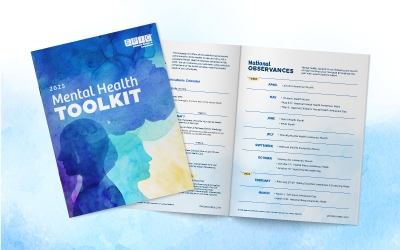As an employer, you already know the importance of mental health care as foundational and vital to your employees’ total wellbeing and productivity. You’ve likely seen or heard a story about mental health professional shortages in the U.S. Maybe a friend or family member struggled to locate help, or you changed health insurance carriers, and one of your providers wasn’t in your new network. Finding a mental health provider – especially one that participates in your health plan – is difficult. As a member of the National Association of Benefits and Insurance Professionals’ (NABIP’s) Mental Health Working Group and co-chair of the California Agents and Health Insurance Professionals’ (CAHIP’s) Mental Health Task Force, I have heard many such stories and experienced this issue firsthand.
Why is it so hard to find an in-network mental health provider?
A 2019 Milliman Report revealing the shortage of in-network mental health care providers uncovers why. The incentive for mental health professionals to take insurance is significantly lower than for primary care and specialty care providers. Reporters for a recent NPR story interviewed more than 500 mental health care providers in almost all 50 states, from rural communities to large cities. The correspondents found that providers who dropped out of health insurance networks conveyed the following reasons:
- Interference with treatment plans: For example, the carrier questioned the necessity of care after six months of treatment.
- Getting tangled up in red tape: Over 100 providers left networks because of customer service issues such as slow response times, delays in processing claims appeals, and complex system navigation. For example, being put on hold for two hours, no explicit disclosure of relevant addresses and fax numbers, or year-long claims appeal processing.
- Financially unsustainable: More than 130 providers left networks due to low reimbursement rates. These rates have not changed in years, and rates for mental health clinicians are lower than those of medical providers for similar services. Out-of-network mental health therapists can earn more than double the average in-network rate of $98 for a 45-minute session.
- Payment delays and clawbacks: Many states generally limit an insurer from “clawing back” payments (i.e., recovering money that has already been paid out, sometimes with penalties) more than two years after a claim is paid, but about ten states have no clawback restrictions.
An analysis of federal survey data collected from multiple surveys showed that patients are more than twice as likely to pay their entire bill out of pocket for visits to mental health providers than primary care physicians.
Which mental health care protections are in place?
Federal Protections
The federal Mental Health Parity and Addiction Equity Act (MHPAEA) requires insurers to offer the same access to mental health care as physical care. In general, they must have the same or more generous annual and lifetime limits, equal financial requirements and quantitative treatment limitations, and equal non-quantitative treatment limitations (NQTLs). Plan sponsors must provide an NQTL analysis to the Department of Labor (DOL) upon request. The DOL audits plan sponsors to ensure compliance.
State Protections
Neither the MHPAEA nor any other federal law include requirements regarding insurer’s medical necessity standards. As a result, states have created laws that govern the plans in their jurisdictions. Nine states, including Oregon and Illinois, have defined the clinical standards or criteria that insurers must use when making coverage decisions on mental health care. These laws apply to fully insured individual and group policies purchased through state marketplaces and directly from carriers.
The Kennedy Forum created model legislation for states based on California’s SB 855, effective January 1, 2021. This legislation requires insurers to make mental health coverage decisions based on clinical and scientific expertise. A spokesperson for the CA Department of Managed Health Care said the agency is auditing insurers to determine whether their networks offer enough providers to serve customers and whether they deliver timely access to care. California also passed SB 221, which is related to timely care access and provides this Fact Sheet for consumers.
States have also instituted medical necessity protections for substance use treatment. For example, in Colorado, Maryland, Delaware, Connecticut and several other states, insurers must rely on guidelines from the American Society of Addiction Medicine when reviewing treatments for substance use.
In recent years, at least 24 states have passed legislation to try to regulate how insurers conduct reviews of behavioral health care. New York law requires insurers to rely on criteria based on evidence and the state’s approval when scrutinizing care. Peer reviewers who work for insurance companies to assess medical necessity or appropriateness of care must be licensed providers with relevant expertise in mental health. Several states, including Massachusetts, New Mexico and Hawaii, make insurers disclose to patients and providers the criteria or policies they rely on for reviews. In Delaware, insurers are generally prohibited from reviewing inpatient substance use treatment in the first 14 days. In Kentucky and Ohio, insurers cannot request more than one review annually for outpatient care for patients with autism.
To hold insurers accountable, at least 31 states and the District of Columbia have passed laws requiring insurers to report how much access they truly provide to mental health care. Most of these states ask insurers to provide details on their treatment criteria or limitations.
More Resources:
People can file complaints with their state insurance departments if they believe an insurer is violating their rights.
See California’s Timely Access to Care Fact Sheet.
The National Alliance on Mental Illness (NAMI) suggests many free resources, including:
- Education program resources to help navigate the public mental health care, school and juvenile justice systems.
- NAMI Basics provides a mental health education program for parents, caregivers and other family members who care for individuals ages 22 and under.
- Navigating a Mental Health Crisis | NAMI
The Kennedy Forum’s “Don’t Deny Me” campaign educates consumers and providers about patient rights under the MHPAEA and connects them with essential appeals guidance and resources.
EPIC Employee Benefits Compliance Services
For further information on this or any other topics, please contact your EPIC consulting team.
Learn About Our Employee Benefits Compliance Services
EPIC offers this material for general information only. EPIC does not intend this material to be, nor may any person receiving this information construe or rely on this material as, tax or legal advice. The matters addressed in this document and any related discussions or correspondence should be reviewed and discussed with legal counsel prior to acting or relying on these materials.
RESERVE YOUR SEAT | NOVEMBER 21
COMPLIANCE MATTERS WEBINAR
Mental Health Parity Final Rules
Sign up for our Compliance Matters Newsletter
You’ll receive our monthly newsletter, as well as special compliance alerts and invitations to our compliance webinars
Related Content
Products
Employee Benefits Consulting
Our dedicated benefits team is focused on delivering better outcomes – to both your benefits program and ...
Products
Compliance
We provide comprehensive consulting services and in-depth education regarding the ever-changing employee ...
Products
Wellbeing & Health Management
Our consultants help you create a strategy around health management that will impact your culture and your ...



